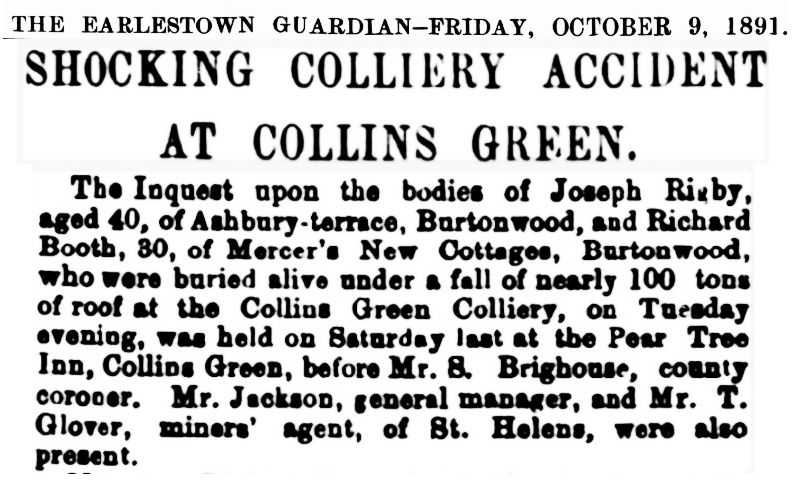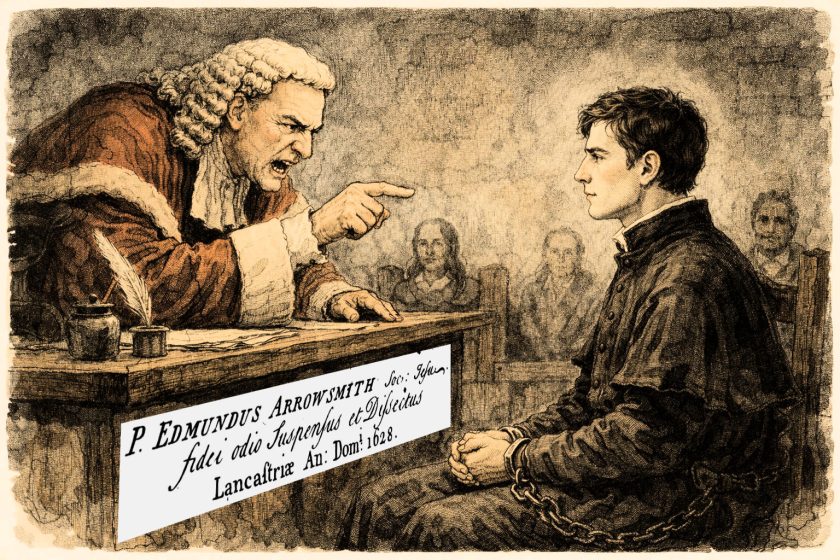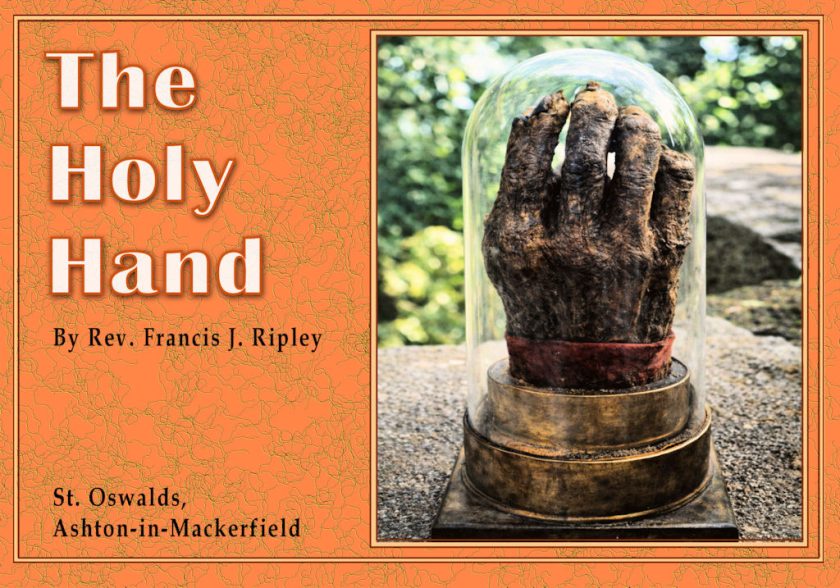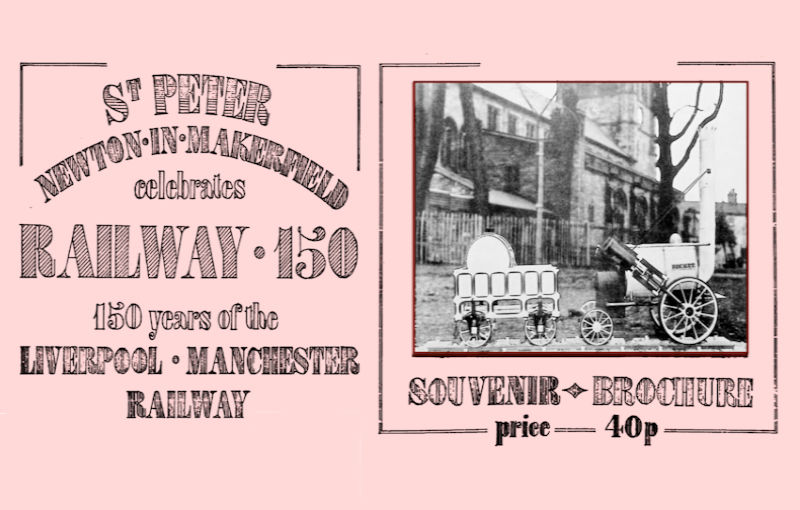Newton and Earlestown Guardian – Friday 09 October 1891
The Inquest upon the bodies of Joseph Rigby, aged 40, of Ashbury-terrace, Burtonwood, and Richard Booth, 30, of Mercer’s New Cottages, Burtonwood, who were buried alive under a fall of nearly 100 tons of roof at the Collins Green Colliery, on Tuesday evening, was held on Saturday last at the Pear Tree Inn, Collins Green, before Mr. 8. Brighouse, county coroner, Mr. Jackson, general manager, and Mr. T. Glover, miners’ agent, of St. Helens, were also present. Mrs. Ann Rigby last saw her husband alive at 30 minutes past two on Tuesday afternoon, Sept. 20th, and he was brought home dead at night, He bad worked two years at Collins Green as & day wage man, and before that was occupied for about five years at the Sherdley Collieries. He had good eyesight sad good hearing. Before he went to work he said be {felt quite upset and did not know whether to go or not. She persuaded him not to go, but be said he would come back about seven o’clock and that would not be very long.
By the Coroner: He had been unwell for some time. It was in consequence of his bodily health and not through fear that he felt upset.
Mrs. Mary Aon Dowd said Richard Booth had lodged with her at Burtonwood for 7 1/2 years. He was 30 years of age and had never been married, She last saw him alive on Tuesday afternoon, and at night he was brought home dead. He had good health. and she had never heard him complain of his work.
James Taylor, fireman, stated he had been a fireman nearly 5 years at these collieries. He saw Rigby and Booth going to their work at ten minutes past three. They had been working in this tunnel on the Monday night before. Their orders were to pick the dirt off the timber and then take it out and put new in. The tunnel led from the pit eye to the Potato Delph mine and was called a “jig”” brow. The roadway was about nine feet wide, and the most part of it was 5 feet high, but at the place where the men bad to work the place was only three feet six inches high, their work was to take down 18 inches of the roof to make it five feet high like the rest of the brow. The low part of the roof would extend for about six yards. They were only supposed to do about one bar & night. When the men got the dirt off the bar they had to put another over it and set the props before taking the old props out. That kind of work could only be done by skilled men, and deceased’s were thoroughly practical men. After he had met the men going to work, he was going to visit them again when he came across the fall at ten minutes past four, He was going up the brow at the time. he at once got assistance, and Rigby was got out at ten minutes to nine, and Booth’s body was recovered ten minutes later. The rescue gang worked uphill and when Mr. Jackson came he gave the charge over to him. Rigby was found laid down flat, while Booth was leaning over a box. The whole of the piece they had 1o take down, with the timber and roof, bad come down. The amount of fall would be about 60 tons, It was not his duty to inspect the place before the men started.
By Mr. Glover: Examined the place five days before the accident, when the bars were very good then. At the time he came across the fall he was going to visit the men and inspect, The place had been inspected by the fireman on the other turn.
Adam Thompson, head firenan, had been fireman for 20 years, and over three years at these collieries. Inspected the roadway at a quarter to three before the men started work. Both he and Rigby inspected the place the week before. Told him to pick the roof off the bars and put another in before knocking out the old ones. This would be about five minutes past three, after he had inspected the place. At the time he examined the place it looked pretty fair. As far as he knew the men started at the bottom end, continuing from the place where they left off. Besides the orders given to a msn as to how to do that work, it required him to use his judgment. Rigby was a skilled hand, in fact, he had driven that very tunnel some time before. There was plenty of timber at the place for them to use. Did not know anything about the accident on the Tuesday night, and not until Wednesday morning.
By Mr. Glover: When he examined the place he found the bars were all good and not one of them broken. He gave them instructions not to take more than one bar out at a time, Gave them instructions to start at the lower end, and he supposed that at the time of the fall Booth was fetching an empty tub from the top end, which would account for him not being at the lower end. Mr, Jackson said that Rigby left word at the pit top that he would be up again before seven o’clock to attend the ambulance class; and whether he was a practical man or not, if he wanted to get his work done quickly, he might have taken a hammer and knocked the bar out, making up his mind to run the risk of the roof coming down. A hammer was found at the place where the first bar had been set.
Mr. Glover was of the same opinion, that the men had knocked the bar out in order to save time.
The Coroner said that in an enquiry of this sort they had the advantage of having everybody represented, as the colliery officials and miners’ agent were there to ask questions. In that particular case Her Majesty’s Inspector had been down and examined the place. He had had a consultation with him about it, and from bis experience he said that was work that was bound to be done by skilled workmen, because the roof was all loose, being only kept up by a ceiling of timber. When they removed that ceiling it stood to sense that it was dangerous work and they must have men that understood it. If they had all the officials of the colliery looking on they could not help it, and must have experienced men who would use their judgment. It was for them to say whether the colliery officials sent to the work men who were experienced. They had heard what they said. The visiting of the places and men while at their work was a very important point. How it came about and what the men were doing when the fall came it was impossible for them to say, as the witnesses could not tell them anything about it.
The jury returned a verdict of “Accidental Death.”
This has been transcribed from a copy of the Newton and Earlestown Guardian – Friday 09 October 1891.
There have been lots of accidents and deaths in local collieries, this one caught my interest because it mentions the terraced houses on Mercer Street as “Mercer’s New Cottages” and also, because it was my own Great Grandmother Mrs. Mary Ann Dowd who was giving evidence.



